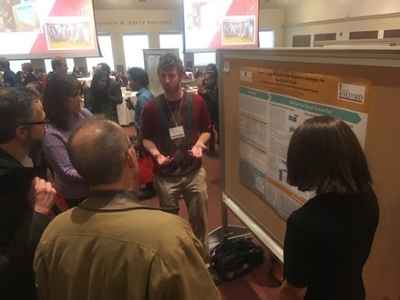Environmental Science Masters students collaborate with the city of Oxford in global climate and energy commitment

Written by Dania Puente, CAS communications intern

The 2017-18 team of IES MEn students present their project at the 2018 Graduate Research Forum.
Last year on September 3, Oxford's City Council voted to sign the Global Covenant of Mayors for Climate and Energy commitment, which aims to measure, track and reduce greenhouse gas (GHG) emissions locally. This is the largest global alliance for city climate leadership with over 10,000 participating cities in 138 countries.
This commitment is a collaboration between the City of Oxford and Miami University's Institute for the Environment and Sustainability (IES). Since Fall 2017, master's in environmental science (MEn) students have been helping the city with the Covenant's requirements.
This project satisfies one of the core program requirements, also known as the Professional Service Project (PSP), which aims to provide a client with a solution and deliverables for an applied problem. The PSP is supervised by IES associate director Suzanne Zazycki, who noted that generally, IES assists a client for one year. But for the past three years IES has had the pleasure of working with the City of Oxford on three distinct but related projects.
"In 2017, a team of IES MEn students conducted a feasibility study to determine if Oxford had the resources to properly participate in the Global Covenant," Zazycki said. "In Fall 2018, before the City signed the Covenant, another team of MEn students initiated a greenhouse gas (GHG) inventory of Local Government Operations (LGO). This year, the third team of MEn students is finalizing that LGO GHG inventory, and providing Oxford with guidance on how to conduct the community-wide GHG inventory."
Working with Oxford City Council

The 2018-19 team of IES MEn students discuss the project with Oxford City Council members.
David Treleaven, an environmental specialist for Oxford City Council and liaison between the city and the environmental commission, has worked closely with IES PSPs and attended the final presentations for all projects.
"Students tend to start off with a very large general idea, and as they discover more details they become more niche," said Treleaven. "In that aspect the information they provide is very good."
Treleaven added that "students have mostly completed the LGO, and they are working on pulling together a manual on how to best tackle the community-wide inventory."
Second-year MEn student Jocelyn Swamidos participated in the project during the 2018-2019 academic year. She and her project classmates researched the best methods to track GHG emissions over time and how to undertake the GHG inventory. They then presented their progress and findings to Oxford City Council.
"One of my favorite aspects of the project was that it helped me take initiative and it increased my confidence," said Swamidos. "The people I worked with supported me a lot and we always looked out for each other."
Swamidos' two biggest takeaways from the PSP were team building and public speaking.
"I was working with people in different fields having different expertises and personalities, so team-building was one of the biggest things I learned," she said. "We had a few meetings with the city council to give updates on our projects, and talking to people in a group has increased my public speaking skills."
Managing Group Work While Social Distancing

The 2018-19 team of IES MEn students give the final presentation to Oxford City Council members.
Cecil Okotah is a first-year MEn student currently working on the project. However, given the current global situation of the COVID-19 outbreak, Okotah and his PSP classmates have had to adapt to working remotely.
"My team and I are strategically working remotely with the city through Google Hangouts, and it's been going great," said Okotah. "This is actually a good opportunity for us to learn to work remotely, since a future career path may involve working with people this way. It's actually a great opportunity for us to learn."
Okotah described how this project has given him both exposure to research and learning about the importance of emissions and waste management.
"Working on this project gives me an idea on what things a city has to do in order to reduce its emissions," he said. "It's been eye-opening to learn how to calculate emission activities and how to cut back on our emissions."
Geography professor David Prytherch, chair of the Campus Planning Committee, as well as the City of Oxford Planning Commission explained that via the PSP projects, students are presented with a unique opportunity that ultimately enhances their academic and professional growth.
"It's not only an incredible educational experience, but it prepares these students to be real-world leaders in what will be the most pivotal conversations of the 21st century," he said. "They are doing the greenhouse inventory for a community, and that's a fairly unique experience."
Although graduate education always emphasizes research, students are also producing work that has political and environmental impact.
"In terms of applied research, the practica that the students do is very impactful for them and for the partnering communities," he said. "We are a public university, and both Oxford and Ohio are better because of the IES PSP program. We'd have trouble doing this work without the student PSP teams."

